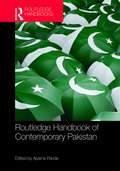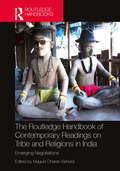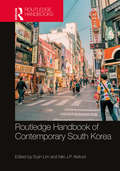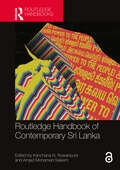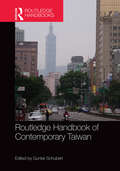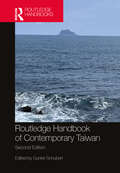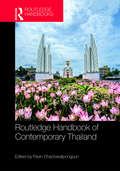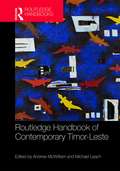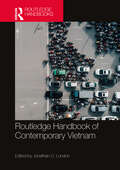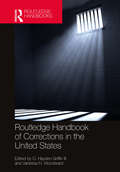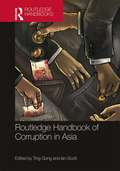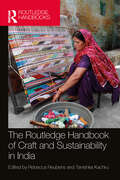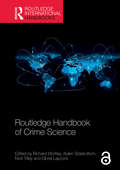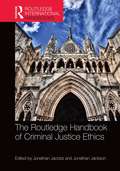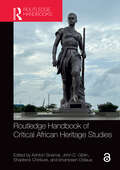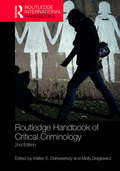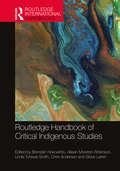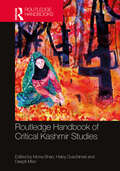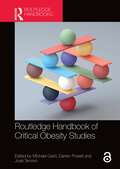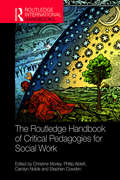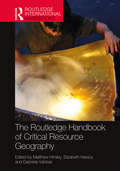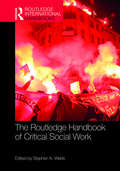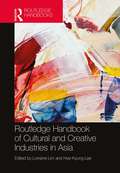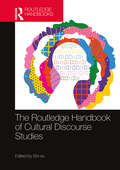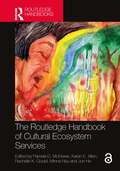- Table View
- List View
Routledge Handbook of Contemporary Pakistan
by Aparna PandeWith a population of 190 million, Pakistan is strategically located at the crossroads of the Middle East, Central and South Asia, and has the second largest Muslim population in the world. The Routledge Handbook of Contemporary Pakistan provides an in-depth and comprehensive coverage of issues from identity and the creation of Pakistan in 1947 to its external relations as well as its domestic social, economic and political issues and challenges. The Handbook is divided into the following sections: • Economy and development • External relations and security • Foundations and identity • Islam and Islamization • Military and jihad • Politics and institutions • Social issues The Handbook explains the reasons why Pakistan is so often at the forefront of our daily news intake, with a focus on religious and political factors. It asks questions regarding the institutions and political parties which govern Pakistan and provides an insight into the relationships which the country has forged since its creation, culminating in a discussion of the state’s involvement in conflict. Covering a range of topics, this Handbook offers a wide range of perspectives on Pakistan. Bringing together a group of leading international scholars on Pakistan, the Handbook is a cutting-edge and interdisciplinary resource for those interested in studying Pakistani politics, economics, culture and society and South Asian Studies.
The Routledge Handbook of Contemporary Readings on Tribe and Religions in India: Emerging Negotiations
by Maguni Charan BeheraTribal societies in India observe a diverse set of religious practices which are a quintessential part of their community life. This handbook explores rituals, beliefs, ceremonies and festivals, liturgy, knowledge and traditions that tribal people practice today and traces the history of their interaction with other religions, communities and cultures.The book provides analytical, intellectual, and cultural insights into the religious tradition of tribes within the interactive space of a pan-Indian civilisation. It examines contemporary religious practice within tribes while also exploring changes either brought on by interactions or political interventions. The volume reflects on the intersections of cultural or political life of communities and their religious worldviews. The book also discusses the processes of assimilation or adoption of different religion or religious traditions by tribes and the challenges of detribalisation and shrinking populations of vulnerable groups. It explores both established and emerging dynamics in the field of tribe and religion and provides a look into the unique systems of kinship, worship and life within many different tribal communities in India.This and its companion handbook, The Routledge Handbook of Tribe and Religions in India: Contemporary Readings on Spirituality, Belief and Identity, provide a comprehensive look into the religious life and practices of a very diverse group of tribes in India. It will be of interest to academics and researchers working in the fields of religion, anthropology, indigenous and tribal studies, social and cultural anthropology, sociology of culture, sociology of religion, development studies, history, political science, folkloristic, and colonialism.
Routledge Handbook of Contemporary South Korea
by Sojin LimThe Routledge Handbook of Contemporary South Korea offers a ground-breaking study of the socio-political development of the Korean peninsula in the contemporary period. Written by an international team of scholars and experts, contributions to this book address key intellectual questions in the development of Korean studies, projecting new ways of thinking about how international systems can be organised and how local societies adapt to global challenges. Academically rigorous, each chapter defines current research and lends the reader greater understanding of the social, cultural, economic, and political developments of South Korea, ranging from chapters on the Korean Wave to relations with North Korea and the Korean language overseas. The volume is divided into eight sections, each representing a focused area of inquiry: socio-political history contemporary politics political economy and development society culture international relations security and diplomacy South Korea in international education This handbook provides an interdisciplinary and comprehensive account of contemporary South Korea. It will be of great interest to students and scholars of Korean history, politics and international relations, culture and society, and will also appeal to policy makers interested in the Indo-Asia Pacific region.
Routledge Handbook of Contemporary Sri Lanka
by Kanchana N. Ruwanpura Amjad Mohamed SaleemThe Routledge Handbook of Contemporary Sri Lanka offers a comprehensive survey of issues facing the island country and an overview delineating some key moments in the country’s contemporary polity, economy, and sociality.This book outlines aspects and influences foundational to understanding a country defined by its economic and political turmoil, and rift with public distrust in today’s shifting geopolitics. Chapters by various established scholars highlight this book’s pivotal contribution in situating Sri Lanka’s turmoil and deprivation in this current conjuncture.The handbook is structured in seven parts: Nations and Nationalism Politics, State and Institutions Economy and Political Economy Work and Life Environment and Environmental Politics Society, Social Systems, and Culture Moment of Flux, Looking Ahead Each part includes on average six chapters covering the social sciences and humanities to survey emerging and cutting-edge areas of the study of Sri Lanka. Multi-disciplinary in focus, the book also includes an introductory section and concluding section, which creates the space and platform for senior, mid-ranking, and junior academics to engage in dynamic conversation with each other about contemporary Sri Lanka. Including scholarship from Sri Lankan experts, the handbook creates academic output, which chimes with broader calls in academia on decolonising the academic landscape.An important reference work, this handbook will be of interest to scholars and students from wideranging academic disciplines and a focus on Sri Lanka, Asian and South Asian studies, sociology, environmental politics, development, labour, management, political economy and anthropology.The Open Access version of this book, available at http://www.taylorfrancis.com, has been made available under a Creative Commons Attribution-Non Commercial-No Derivatives (CC-BY-NC-ND) 4.0 license.
Routledge Handbook of Contemporary Taiwan
by Gunter SchubertThe Routledge Handbook of Contemporary Taiwan offers a comprehensive overview of both contemporary Taiwan and the Taiwan studies field. Each contribution summarises the major findings in the field and highlights long-term trends, recent observations and possible future developments in Taiwan. Written by an international team of experts, the chapters included in the volume form an accessible and fascinating insight into contemporary Taiwan. Up-to-date, interdisciplinary, and academically rigorous, the Handbook will be of interest to students, academics, policymakers and others in search of reliable information on Taiwanese politics, economics, culture and society.
Routledge Handbook of Contemporary Taiwan
by Gunter SchubertThis fully revised 2nd edition of the Routledge Handbook of Contemporary Taiwan provides a comprehensive overview of both contemporary Taiwan and the Taiwan studies field.Written by an international team of Taiwan experts, the Handbook includes major topics in Taiwanese history, domestic politics, political economy, society, culture, and international relations. Each chapter summarises the major findings in the field and highlights long-term trends, recent observations, and potential future developments in Taiwan, revealing its long journey from a frontier island to a highly industrialised country struggling for international recognition.Up-to-date, interdisciplinary, and academically rigorous, the Handbook offers the reader an accessible and fascinating insight into contemporary Taiwan and will be of interest to students, academics, and policymakers with an interest in all things Taiwan.
Routledge Handbook of Contemporary Thailand
by Pavin ChachavalpongpunThe Routledge Handbook of Contemporary Thailand is a timely survey and assessment of the state of contemporary Thailand. While Thailand has changed much in the past decades, this handbook proposes that many of its problems have remained intact or even persistent, particularly problems related to domestic politics. It underlines emerging issues at this critical juncture in the kingdom and focuses on the history, politics, economy, society, culture, religion and international relations of the country. A multidisciplinary approach, with chapters written by experts on Thailand, this handbook is divided into the following sections. History Political and economic landscape Social development International relations Designed for academics, students, libraries, policymakers and general readers in the field of Asian studies, political science, economics and sociology, this invaluable reference work provides an up-to-date account of Thailand and initiates new discussion for future research activities.
Routledge Handbook of Contemporary Timor-Leste
by Andrew McWilliam Michael LeachReflecting on the legacies of Timor-Leste's remarkable journey from colonialism to sovereign and democratic Independence, the Routledge Handbook of Contemporary Timor-Leste provides a comprehensive and up-to-date reference work on all aspects of life in Timor-Leste. Following an introduction and overview of the country, the Handbook is divided into five parts: Politics and governance Economics and development Social policies and the terms of inclusion Cultural impacts Regional relations Written by an international team of experts, the Handbook covers the principle concerns that have contributed significantly to the shape and character of contemporary Timor-Leste. It offers a timely and valuable reference guide for students, scholars and policymakers with an interest in International Relations, Southeast Asian Studies and Peace Studies.
Routledge Handbook of Contemporary Vietnam
by Jonathan D. LondonThe Routledge Handbook of Contemporary Vietnam is a comprehensive resource exploring social, political, economic, and cultural aspects of Vietnam, one of contemporary Asia’s most dynamic but least understood countries. Following an introduction that highlights major changes that have unfolded in Vietnam over the past three decades, the volume is organized into four thematic parts: •Politics and Society•Economy and Society•Social Life and Institutions•Cultures in Motion Part I addresses key aspects of Vietnam’s politics, from the role of the Communist Party of Vietnam in shaping the country’s institutional evolution, to continuity and change in patterns of socio-political organization, political expression, state repression, diplomatic relations, and human rights. Part II assesses the transformation of Vietnam’s economy, addressing patterns of economic growth, investment and trade, the role of the state in the economy, and other economic aspects of social life. Parts III and IV examine developments across a variety of social and cultural fields through chapters on themes including welfare, inequality, social policy, urbanization, the environment and society, gender, ethnicity, the family, cuisine, art, mass media, and the politics of remembrance. Featuring 38 essays by leading Vietnam scholars from around the world, this book provides a cutting-edge analysis of Vietnam’s transformation and changing engagement with the world. It is an invaluable interdisciplinary reference work that will be of interest to students and academics of Southeast Asian studies, as well as policymakers, analysts, and anyone wishing to learn more about contemporary Vietnam.
Routledge Handbook of Corrections in the United States (Routledge International Handbooks)
by O. Hayden Griffin III and Vanessa H. WoodwardThe Routledge Handbook of Corrections in the United States brings together original contributions from leading scholars in criminology and criminal justice that provide an in-depth, state-of-the-art look at the most important topics in corrections. The book discusses the foundations of corrections in the United States, philosophical issues that have guided historical movements in corrections, different types of punishment and supervision, trends in incarceration, issues affecting race, ethnicity, and special populations in corrections, and a variety of other emerging issues. This book scrutinizes innovative community programs as well as more traditional sanctions, and exposes the key issues and debates surrounding the correctional process in the United States. Among other important topics, selections address the inherent discrimination within the system, special issues surrounding certain populations, and the utilization of the death penalty as the ultimate punishment. This book serves as an essential reference for academicians and practitioners working in corrections and related agencies, as well as for students taking courses in criminal justice, criminology, and related subjects.
Routledge Handbook of Corruption in Asia
by Ting Gong Ian ScottCorruption in Asia ranges from the venal rent-seeking of local officials to the million-dollar bribes received by corrupt politicians; from excessive position-related consumption to future job offers in the private sector for compliant public servants; from money-laundering to ‘white elephant’ projects that do little more than line the pockets of developers and their political partners. The Routledge Handbook of Corruption in Asia addresses the theories, issues and trends in corruption and anticorruption reform that have emerged from this diverse experience. The book is divided into four major parts: corruption and the state; corruption and economic development; corruption and society; and controlling corruption: strategies, successes and failures. Chapters compare and contrast corruption in different social and institutional contexts, examine both successful and unsuccessful attempts to control it, and consider what lessons can be drawn from these Asian experiences. This academically rigorous and insightful book will be of interest to a wide range of students and scholars, particularly those of Asian studies, politics and sociology.
The Routledge Handbook of Craft and Sustainability in India
by Rebecca Reubens Tanishka KachruTraditional crafts have been an essential part of Indian history, culture and life. This handbook looks at craft as both a cultural artefact that reflects people’s worldviews, indigenous practices and traditions, as well as a source of income generation and development that is inclusive. India’s rapid development has meant a breakdown of traditional economies, and including craft production-to-consumption systems. Meanwhile, there is a call to action from different factions to protect, revive and reinvent craft, because the inherent sustainability of the systems that underpin it are essential for the sustainability of India and her people. Against this backdrop, this book examines the current landscape of craft in India—its production and marketing in different parts of India, the incorporation of innovation and technology, the push for sustainability and equitability in the handicraft ecosystem and promising government policies that have proved beneficial for craftspeople. It also discusses various challenges that artisans, micro-entrepreneurs, and marketers face working in the space. With contributions from leading experts in the field of design, activism, policy, education, cultural heritage and entrepreneurship, this volume provides a comprehensive and in-depth picture of the history, economics and future of craft and its relationship with sustainability.An authoritative resource on Indian craft, this handbook will be useful for scholars and researchers of sustainable development, development studies, architecture, design, heritage studies, cultural studies, political economy and public policy.
Routledge Handbook of Crime Science (Routledge International Handbooks)
by Gloria Laycock Nick Tilley Aiden Sidebottom Richard WortleyCrime science is precisely what it says it is: the application of science to the phenomenon of crime. This handbook, intended as a crime science manifesto, showcases the scope of the crime science field and provides the reader with an understanding of the assumptions, aspirations and methods of crime science, as well as the variety of topics that fall within its purview. Crime science provides a distinctive approach to understanding and dealing with crime: one that is outcome-oriented, evidence-based and that crosses boundaries between disciplines. The central mission of crime science is to find new ways to cut crime and increase security. Beginning by setting out the case for crime science, the editors examine the roots of crime science in environmental criminology and describe its key features. The book is then divided into two sections. The first section comprises chapters by disciplinary specialists about the contributions their sciences can make or have already made to crime science. The second section of the book comprises a series of exemplary case studies in crime science, showing a wide range of the kind of work that crime scientists do. The editors conclude by drawing on the preceding contributions, as well as germane areas of research, to offer a thoughtful consideration of future directions for crime science. This book is essential reading for social scientists and scientists alike and marks a new phase in the study of crime and its detection and prevention.
The Routledge Handbook of Criminal Justice Ethics (Routledge International Handbooks)
by Jonathan Jacobs Jonathan JacksonThe enormous financial cost of criminal justice has motivated increased scrutiny and recognition of the need for constructive change, but what of the ethical costs of current practices and policies? Moreover, if we seriously value the principles of liberal democracy then there is no question that the ethics of criminal justice are everybody’s business, concerns for the entire society. The Routledge Handbook of Criminal Justice Ethics brings together international scholars to explore the most significant ethical issues throughout their many areas of expertise, anchoring their discussions in the empirical realities of the issues faced rather than applying moral theory at a distance. Contributions from philosophers, legal scholars, criminologists and psychologists bring a fresh and interdisciplinary approach to the field. The Handbook is divided into three parts: Part I addresses the core issues concerning criminal sanction, the moral and political aspects of the justification of punishment, and the relationship between law and morality. Part II examines criminalization and criminal liability, and the assumptions and attitudes shaping those aspects of contemporary criminal justice. Part III evaluates current policies and practices of criminal procedure, exploring the roles of police, prosecutors, judges, and juries and suggesting directions for revising how criminal justice is achieved. Throughout, scholars seek pathways for change and suggest new solutions to address the central concerns of criminal justice ethics. This book is an ideal resource for upper-undergraduate and postgraduate students taking courses in criminal justice ethics, criminology, and criminal justice theory, and also for students of philosophy interested in punishment, law and society, and law and ethics.
Routledge Handbook of Critical African Heritage Studies
by Ashton Sinamai John D. Giblin Shadreck Chirikure Ishanlosen OdiauaThis handbook is a foundational reference point for critical heritage research about Africa and its diaspora.Foregrounding the diversity of knowledge systems needed to examine heritage issues in such a diverse continent, the contributors to this volume: argue for an understanding heritage that is at once both natural and cultural, tangible and intangible, political and dissonant, going beyond the physical and objective to include subjective narratives, performances, rituals, memories and emotions examine the pre-coloniality, coloniality, post-coloniality, and decoloniality of current African heritage discourses and their consequences analyse how heritage legislation derived from colonial law is compatible or otherwise with how heritage is perceived, identified and remembered in African communities discuss questions of repatriation, restitution and reparations in relation to the return of artefacts from Western countries illuminate the importance of ‘difficult heritage’ within Africa and its diaspora consider the role of heritage for development in Africa Making a crucial contribution to our understanding of African conceptions and practices of heritage, this book is an important read for scholars of African Studies, heritage and museum studies, archaeology, anthropology and history.
Routledge Handbook of Critical Criminology: 2nd edition (Routledge International Handbooks)
by Walter S. Dekeseredy Molly DragiewiczThe main objective of the second edition of the Routledge Handbook of Critical Criminology is twofold: (1) to provide original chapters that cover contemporary critical criminological theoretical offerings generated over the past five years and (2) to provide chapters on important new substantive topics that are currently being studied and theorized by progressive criminologists. Special attention is devoted to new theoretical directions in the field, such as southern criminology, queer criminology, and green criminology. The diverse chapters cover not only cutting-edge theories, but also the variety of research methods used by leading scholars in the field and the rich data generated by their rigorous empirical work. In addition, some of the chapters suggest innovative and realistic short- and long-term policy proposals that are typically ignored by mainstream criminology. These progressive strategies address some of the most pressing social problems facing contemporary society today, which generate much pain and suffering for socially and economically disenfranchised people. The new edition of the Handbook is a major work in redefining areas within the context of international multidisciplinary critical research, and in highlighting emerging areas, such as human trafficking, Internet pornography and image-based sexual abuse. It is specifically designed to be a comprehensive resource for undergraduate and postgraduate students, researchers and policymakers.
Routledge Handbook of Critical Indigenous Studies (Routledge International Handbooks)
by Brendan Hokowhitu, Aileen Moreton-Robinson, Linda Tuhiwai-Smith, Chris Andersen and Steve LarkinThe Routledge Handbook of Critical Indigenous Studies is the first comprehensive overview of the rapidly expanding field of Indigenous scholarship. The book is ambitious in scope, ranging across disciplines and national boundaries, with particular reference to the lived conditions of Indigenous peoples in the first world. The contributors are all themselves Indigenous scholars who provide critical understandings of indigeneity in relation to ontology (ways of being), epistemology (ways of knowing), and axiology (ways of doing) with a view to providing insights into how Indigenous peoples and communities engage and examine the worlds in which they are immersed. Sections include: • Indigenous Sovereignty • Indigeneity in the 21st Century • Indigenous Epistemologies • The Field of Indigenous Studies • Global Indigeneity This handbook contributes to the re-centring of Indigenous knowledges, providing material and ideational analyses of social, political, and cultural institutions and critiquing and considering how Indigenous peoples situate themselves within, outside, and in relation to dominant discourses, dominant postcolonial cultures and prevailing Western thought. This book will be of interest to scholars with an interest in Indigenous peoples across Literature, History, Sociology, Critical Geographies, Philosophy, Cultural Studies, Postcolonial Studies, Native Studies, Māori Studies, Hawaiian Studies, Native American Studies, Indigenous Studies, Race Studies, Queer Studies, Politics, Law, and Feminism.
Routledge Handbook of Critical Kashmir Studies
by Deepti Misri Mona Bhan Haley DuschinskiThe Routledge Handbook of Critical Kashmir Studies presents emerging critical knowledge frameworks and perspectives that foreground situated histories and resistance practices to challenge colonial and postcolonial forms of governance and state building. It politicizes discourses of nationalism, patriotism, democracy, and liberalism, and it questions how these dominant globalist imaginaries and discourses serve institutionalized power, create hegemony, and normalize domination. In doing so, the handbook situates Critical Kashmir Studies scholarship within global scholarly conversations on nationalism, sovereignty, indigenous movements, human rights, and international law. The handbook is organized into the following five parts: • Territories, Homelands, Borders • Militarism, Humanism, Occupation • Memories, Futures, Imaginations • Religion, History, Politics • Armed Conflict, Global War, Transnational Solidarities A comprehensive reference work documenting and consolidating the growing Critical Kashmir Studies scholarship, this handbook will be of interest to scholars of anthropology, political science, cultural studies, legal and sociolegal studies, sociology, history, critical Indigenous studies, settler colonial studies, and feminist studies.
Routledge Handbook of Critical Obesity Studies
by Michael GardThe Routledge Handbook of Critical Obesity Studies is an authoritative and challenging guide to the breadth and depth of critical thinking and theory on obesity. Rather than focusing on obesity as a public health crisis to be solved, this reference work offers divergent and radical strategies alongside biomedical and positivist discourses. Comprised of thirty nine original chapters from internationally recognised academics, as well as emerging scholars, the Handbook engages students, academics, researchers and practitioners in contemporary critical scholarship on obesity; encourages engagement of social science and related disciplines in critical thinking and theorising on obesity; enhances critical theoretical and methodological work in the area, highlighting potential gaps as well as strengths; relates critical scholarship to new and evolving areas of obesity-related practices, policies and research. This multidisciplinary and international collection is designed for a broad audience of academics, researchers, students and practitioners within the social and health sciences, including sociology, obesity science, public health, medicine, sports studies, fat studies, psychology, nutrition science, education and disability studies.
The Routledge Handbook of Critical Pedagogies for Social Work (Routledge International Handbooks)
by Christine Morley Phillip Ablett Carolyn Noble Stephen CowdenThe Routledge Handbook of Critical Pedagogies for Social Work traverses new territory by providing a cutting-edge overview of the work of classic and contemporary theorists, in a way that expands their application and utility in social work education and practice; thus, providing a bridge between critical theory, philosophy, and social work. Each chapter showcases the work of a specific critical educational, philosophical, and/or social theorist including: Henry Giroux, Michel Foucault, Cornelius Castoriadis, Herbert Marcuse, Paulo Freire, bell hooks, Joan Tronto, Iris Marion Young, Karl Marx, Antonio Gramsci, and many others, to elucidate the ways in which their key pedagogic concepts can be applied to specific aspects of social work education and practice. The text exhibits a range of research-based approaches to educating social work practitioners as agents of social change. It provides a robust, and much needed, alternative paradigm to the technique-driven ‘conservative revolution’ currently being fostered by neoliberalism in both social work education and practice. The volume will be instructive for social work educators who aim to teach for social change, by assisting students to develop counter-hegemonic practices of resistance and agency, and reflecting on the pedagogic role of social work practice more widely. The volume holds relevance for both postgraduate and undergraduate/qualifying social work and human services courses around the world.
The Routledge Handbook of Critical Resource Geography (Routledge International Handbooks)
by Matthew Himley Elizabeth Havice Gabriela ValdiviaThis Handbook provides an essential guide to the study of resources and their role in socio-environmental change. With original contributions from more than 60 authors with expertise in a wide range of resource types and world regions, it offers a toolkit of conceptual and methodological approaches for documenting, analyzing, and reimagining resources and the worlds with which they are entangled. The volume has an introduction and four thematic sections. The introductory chapter outlines key trajectories for thinking critically with and about resources. Chapters in Section I, "(Un)knowing resources," offer distinct epistemological entry points and approaches for studying resources. Chapters in Section II, "(Un)knowing resource systems," examine the components and logics of the capitalist systems through which resources are made, circulated, consumed, and disposed of, while chapters in Section III, "Doing critical resource geography: Methods, advocacy, and teaching," focus on the practices of critical resource scholarship, exploring the opportunities and challenges of carrying out engaged forms of research and pedagogy. Chapters in Section IV, "Resource-making/world-making," use case studies to illustrate how things are made into resources and how these processes of resource-making transform socio-environmental life. This vibrant and diverse critical resource scholarship provides an indispensable reference point for researchers, students, and practitioners interested in understanding how resources matter to the world and to the systems, conflicts, and debates that make and remake it.
The Routledge Handbook of Critical Social Work (Routledge International Handbooks)
by Stephen A. WebbThe Routledge Handbook of Critical Social Work brings together the world’s leading scholars in the field to provide a cutting-edge overview of classic and current research and future trends in the subject. Comprised of 48 chapters divided into six parts: Historical, social, and political influences Mapping the theoretical and conceptual terrain Methods of engagement and modes of analysis Critical contexts for practice and policy Professional education and socialisation Future challenges, directions, and transformations it provides an authoritative guide to theory and method, and the primary debates of today in social work from a critical perspective. This handbook is a major reference work and the first book to comprehensively map the wide-ranging territory of critical social work. It does so by addressing its conceptual developments, its methodological advances, its value-based front-line practice and as an influence on the policy field. By offering a definitive survey of current academic knowledge as it relates to professional practice, it provides the first comprehensive, up-to-date, definitive work of reference while at the same time identifying emerging, innovative and cutting-edge areas.
Routledge Handbook of Cultural and Creative Industries in Asia
by Lorraine Lim Hye-Kyung LeeRecent years have witnessed the remarkable development of the cultural and creative industries (CCIs) in Asia, from the global popularity of the Japanese games and anime industries, to Korea’s film and pop music successes. While CCIs in these Asian cultural powerhouses aspire to become key players in the global cultural economy, Southeast Asian countries such as Malaysia and Thailand are eager to make a strong mark in the region’s cultural landscape. As the first handbook on CCIs in Asia, this book provides readers with a contextualized understanding of the conditions and operation of Asian CCIs. Both internationalising and de-Westernising our knowledge of CCIs, it offers a comprehensive contribution to the field from academics, practitioners and activists alike. Covering 12 different societies in Asia from Japan and China to Thailand, Indonesia and India, the themes include: State policy in shaping CCIs Cultural production inside and outside of institutional frameworks Circulation of CCIs products and consumer culture Cultural activism and independent culture Cultural heritage as an industry. Presenting a detailed set of case studies, this book will be an essential companion for researchers and students in the field of cultural policy, cultural and creative industries, media and cultural studies, and Asian studies in general.
The Routledge Handbook of Cultural Discourse Studies (Routledge Handbooks in Linguistics)
by Shi-XuIn response to the cultural challenges in society and scholarship, this handbook presents the conceptions, assumptions, principles, methods, topics and issues in the studies of cultural forms of human communication—cultural discourses—by experts from around the world.A culturalist programme in communication studies (CS), cultural discourse studies (CDS), as represented in this handbook, is a new current of thought in human and social science and a form of academic activism, but above all, it is a fresh paradigm of research committed to enhancing cultural harmony and prosperity on the one hand and facilitating intellectual plurality and innovation on the other hand. This handbook is the first of its kind; it is concerned with the identities of, and interactions between, the world’s diverse cultural communities through locally-grounded and globally-minded, culturally conscious and critical approaches to their communicative practice. Contributors apply such insights, precepts and techniques, not merely to discover and describe past and present communication, but also to design and guide future communication.This handbook is ideal for scholars and students interested in cultural aspects and issues of communication/discourse, as well as researchers of other fields looking to apply cultural discourse methods to their own projects.
The Routledge Handbook of Cultural Ecosystem Services
by Jun He Pamela D. McElwee Karen E. Allen Rachelle K. Gould Minna HsuThe Routledge Handbook of Cultural Ecosystem Services provides an overview of Cultural Ecosystem Services (CES), which are the nonmaterial aspects of benefits that people derive from nature. These diverse and multifaceted contributions can include experiences, capabilities, and identities, among others. The Handbook addresses how these CES are valued, how they reflect human-nonhuman relationships, and what roles they can play in improved human well-being, ecosystem management, and trajectories towards sustainability.This Handbook presents a wide array of perspectives on the roles CES can play in understanding relationships to nature, and on how those relationships might translate into policy. The Handbook includes philosophical approaches to CES, typologies and classifications of types of CES, and case studies of places, people, policies and projects engaging CES. Across seven distinctive Parts, the chapters deliver a number of important practical lessons on how to understand, measure, and value CES, and use examples and applications from around the world, including how CES apply across different biomes. The Handbook also includes a selection of compelling artworks that represent CES in different cultural contexts. The 91 authors represent 19 different countries, providing a rich range of experiences, including a strong focus on the Global South.This book can serve as a comprehensive guide to researchers who are new to CES and wish to understand more about the field, and as a set of go-to instructions for experienced CES researchers. It can also inform policymakers who wish to better incorporate CES into their work.The Open Access version of this book, available at http://www.taylorfrancis.com, has been made available under a Creative Commons Attribution-Non Commercial-No Derivatives (CC BY-NC-ND) 4.0 license
